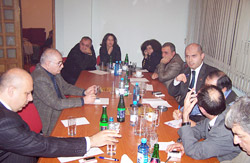In 1993 in Washington DC an African-American taxi driver asked YSU professor, political scientist, Tigran Hakobyan where he’s from. Having known that Hakobyan is from Armenia the driver exclaimed, “Oh, Armenia, democracy and earthquake”. This means that there are certain stereotypes, which are not stable. They are dynamic, achieved recently. “The first one was the earthquake of 1988, the second one is being an island of democracy regardless whether it’s right or wrong. The fact that Armenia is the island of democracy in the region was the opinion of the West. What has changed since then? What opinions are there about Armenia?”, Hakobyan remembered this short story in the “Pressing” club during the discussion on the topic of PR.
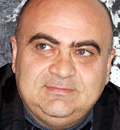 In the beginning of the discussion Hakobyan presented the idea of “image”. “When saying Armenia’s image we understand the opinion of foreigners about our country. Of course this opinion is based on the historical, cultural, political and military stereotypes, through which the world is trying to understand our country.” In the words of the political scientist in the aspect of inner PR of the country it’s important how the citizens of that country understand their values, what their opinion is about the state and the authorities. “If we go deeper we’ll even notice the issue of legitimacy,” said Hakobyan. According to him the outer PR is one of the functions of governance, which tries to establish mutually profitable relations between the organization (in this case our country) and the outer audience, which the success and failure of our country depends on.
In the beginning of the discussion Hakobyan presented the idea of “image”. “When saying Armenia’s image we understand the opinion of foreigners about our country. Of course this opinion is based on the historical, cultural, political and military stereotypes, through which the world is trying to understand our country.” In the words of the political scientist in the aspect of inner PR of the country it’s important how the citizens of that country understand their values, what their opinion is about the state and the authorities. “If we go deeper we’ll even notice the issue of legitimacy,” said Hakobyan. According to him the outer PR is one of the functions of governance, which tries to establish mutually profitable relations between the organization (in this case our country) and the outer audience, which the success and failure of our country depends on.
In order to give certain directions to the presenters Hakobyan demonstrated the conditional scheme of questions to be discussed.
1. Whether PR of the country is conducted in Armenia. If not, then what are the obstacles?
2. Whether Armenia needs a positive image in the world. According to Hakobyan we Armenians often get seduced by the fact when some foreigners demonstrated their slight knowledge about Armenia. “This is just the surface understanding of our country. There is a deeper approach. It’s when the positive image of our country affects the productive use of our resources, investments and the education of our citizens. It’s also very important that the positive image fortifies the success of the countries and the negative one vice versa. This means that even if one has success in the background of a negative image he/she can easily lose it,” mentioned Hakobyan. In his opinion the inner and the outer images of the country should match each other. “If there are conflicts between the people and the government it will be very hard to create a positive image for foreign countries. Of course there are also some other approaches. For example, In North Korea the opinions of the people living in the country on the authorities are totally different than the North Koreans living outside the country. But that’s an exception. PR always functions properly in countries, where the opinions of the people are taken into account by the government. People might argue that we don’t have it in Armenia. But we have some roots for civil society, we just need to develop them,” thinks Hakobyan.
3. What image does Armenia have abroad? Hakobyan thinks that our country of course has some stable image. That’s the historical image, adoption of Christianity. In 2001 a quite good PR was done during the celebration of 1700th anniversary of Christianity. Pope of Rome also visited Armenia. Armenia appeared in global information streams. “We could have organized all that in a more productive way though,” added Hakobyan.
4. Whether our government has any interest and willingness to create an interesting dynamic image about Armenia and whether they succeed or not. “In my opinion there are many successful attempts to create this image. I don’t agree with the philosophy of those attempts. That image doesn’t conduce to the development of Armenia. The image of Armenians is built on the fact that we are a nation, which passed through genocide. Not only is this not efficient but also dangerous. It contains dangerous elements,” said Hakobyan.
5. Whether Armenia should change the mentioned image strategy and what tools it has for that process. Hakobyan thinks that unlike other countries Armenia has more opportunities to do so as it has a huge Diaspora with its organizations and communications.
6. What should be the symbol – the “image brand” of Armenia? “Of course it cannot be a false image brand because it has to more or less correspond to our country. Let me bring one example. When the RA Foreign Minister says that Armenia has become the tiger of Caucasus due to its economic development, it makes me want to laugh because it’s not true. Let’s speak about realistic successes even if they are little,” offered Hakobyan.
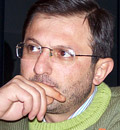 The participants of the discussion approached Armenia’s PR in different aspects. Advisor of news programs of “Yerkir Media” TV company, NA Deputy, Gegham Manukyan, very carefully follows the daily news. “Based on my own experience I can say that during the last seven years Armenia made itself sound unfortunately October 27, 1999, which the international TV companies were talking about us nearly a month.” The second one was in 2001 (it’s still a question whether we were able to properly show ourselves to the international community). Were we able to properly present ourselves through demonstrating 40 virgins dance in the Republic Square in the fog or through Satan-like music? On the 90th anniversary of Genocide Armenia was in the center of the focus of international media. It’s an exceptional case when the Turkish TV companies had a live translation from Tsitsernakaberd. All the well-known media agencies sent reporters to Armenia. No matter how much we claim that the Genocide is gone, the audience still cares a lot about that and the image of our country depends a lot on that. And Armenians are showed in a positive image because they show their morality and consistence. Shall we avoid our past and refuse talking about the tragedy our nation had?” said the ARF member. He thinks that the image of the “democratic island” for Armenia has long gone. “But the information about Genocide can always provide a moral and positive image for Armenia,” mentioned Manukyan.
The participants of the discussion approached Armenia’s PR in different aspects. Advisor of news programs of “Yerkir Media” TV company, NA Deputy, Gegham Manukyan, very carefully follows the daily news. “Based on my own experience I can say that during the last seven years Armenia made itself sound unfortunately October 27, 1999, which the international TV companies were talking about us nearly a month.” The second one was in 2001 (it’s still a question whether we were able to properly show ourselves to the international community). Were we able to properly present ourselves through demonstrating 40 virgins dance in the Republic Square in the fog or through Satan-like music? On the 90th anniversary of Genocide Armenia was in the center of the focus of international media. It’s an exceptional case when the Turkish TV companies had a live translation from Tsitsernakaberd. All the well-known media agencies sent reporters to Armenia. No matter how much we claim that the Genocide is gone, the audience still cares a lot about that and the image of our country depends a lot on that. And Armenians are showed in a positive image because they show their morality and consistence. Shall we avoid our past and refuse talking about the tragedy our nation had?” said the ARF member. He thinks that the image of the “democratic island” for Armenia has long gone. “But the information about Genocide can always provide a moral and positive image for Armenia,” mentioned Manukyan.
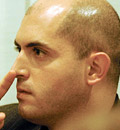 NA Deputy, RPA member, Armen Ashotyan mentioned with pity that in order to get rid of the image of Genocide Armenia must forget about the Genocide issue because it has been passed to the international community for years. “The latter speaks about the Genocide whenever there is need for that. In order to get rid of that image we should choose the most tragic option – that is to refuse the Genocide. I am sure that neither the government nor the people will ever want that. Thus, speaking about the possibility of getting rid of the image of a Genocide victim is too soon or perhaps impossible at this stage,” said Ashotyan. In his speech the Deputy has also spoken about a few elements that form our country’s image. According to Ashotyan a good image for the country can be gained only by a sportsman, who succeeds in international competitions or the culture representative, like a pop star, etc. “We don’t have world famous pop stars but we have good sportsmen. Let’s remember the last chess championship. In regard with Karabagh conflict we have a requirement of a counter-PR and not a PR because when you read the Azerbaijani newspapers seems like our newspapers have wrote those articles. The Azeris are also blaming their government of receding the Armenians in the advocacy front. We have a great issue to solve here,” thinks the deputy. He also mentioned the stereotype that Armenia is tightly tied with Russia. He thinks that this kind of image must be slightly tempered so that the international experts don’t think that we depend on Russia in all aspects.
NA Deputy, RPA member, Armen Ashotyan mentioned with pity that in order to get rid of the image of Genocide Armenia must forget about the Genocide issue because it has been passed to the international community for years. “The latter speaks about the Genocide whenever there is need for that. In order to get rid of that image we should choose the most tragic option – that is to refuse the Genocide. I am sure that neither the government nor the people will ever want that. Thus, speaking about the possibility of getting rid of the image of a Genocide victim is too soon or perhaps impossible at this stage,” said Ashotyan. In his speech the Deputy has also spoken about a few elements that form our country’s image. According to Ashotyan a good image for the country can be gained only by a sportsman, who succeeds in international competitions or the culture representative, like a pop star, etc. “We don’t have world famous pop stars but we have good sportsmen. Let’s remember the last chess championship. In regard with Karabagh conflict we have a requirement of a counter-PR and not a PR because when you read the Azerbaijani newspapers seems like our newspapers have wrote those articles. The Azeris are also blaming their government of receding the Armenians in the advocacy front. We have a great issue to solve here,” thinks the deputy. He also mentioned the stereotype that Armenia is tightly tied with Russia. He thinks that this kind of image must be slightly tempered so that the international experts don’t think that we depend on Russia in all aspects.
When speaking about the inner PR of the country Ashotyan objected Hakobyan’s opinion. “I think no matter how hard we try to connect the two issues (inner and foreign PR) we will still have two great difference. The objective of the state regarding the inner PR doesn’t relate to society-government relationships. The state is a legitimate institute created by people. Therefore it’s not only the state’s task to conduct PR. We still have an issue to making the society appreciate and respect the state. This issue is totally different from PR. Thus the PR of the country should be not only the task of the government but also the society, opposition and government parties and civil society organizations,” said Ashotyan.
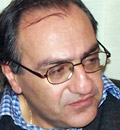 Scientist of East Studies, Davit Hovhannisyan asked the audience to consider the adaptation mechanisms that are to be used, which will conform to modern needs and standards. “We should differentiate the short-term image from the long-term approaches and opinions about a country. The Genocide didn’t change or couldn’t change the estimation on democracy. The victory of our chess players doesn’t change the image of the country but positively additions the existing image. We cannot ignore the Genocide because it’s our history. However, here we should differentiate the image policy from the state policy. When these two are mixed the state policy stops differing from the policy of the Diaspora,” mentioned Hovhannisyan.
Scientist of East Studies, Davit Hovhannisyan asked the audience to consider the adaptation mechanisms that are to be used, which will conform to modern needs and standards. “We should differentiate the short-term image from the long-term approaches and opinions about a country. The Genocide didn’t change or couldn’t change the estimation on democracy. The victory of our chess players doesn’t change the image of the country but positively additions the existing image. We cannot ignore the Genocide because it’s our history. However, here we should differentiate the image policy from the state policy. When these two are mixed the state policy stops differing from the policy of the Diaspora,” mentioned Hovhannisyan.
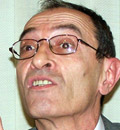 “If we try to follow Hegel Triads we may say that the foreign PR may have three goals,” began his speech NA Deputy Shavarsh Kocharyan. The first goal can conditionally be named global strategic goal. “Let’s say during Soviet times the US was publishing the “America” magazine in Russian. The goal was simple – to destroy the Soviet Union from the inside. ”The second goal may be called tactical, when the country has certain issues, based on which it conducts PR. The primitive example of it is what Azerbaijan is doing right now. According to the Azerbaijani media we do the same. The third goal is the situational one. Here more accent is put on things tat are already known, like adoption of Christianity, Genocide, etc.,” said the deputy. In his words all the countries follow the mentioned three goals differently. Kocharyan believes that Armenia is in the third level. In terms of inner PR the deputy defines the countries into three types – totalitarian, authoritarian and democratic. As an example of the totalitarian PR Kocharyan mentions the Soviet Union’s PR.
“If we try to follow Hegel Triads we may say that the foreign PR may have three goals,” began his speech NA Deputy Shavarsh Kocharyan. The first goal can conditionally be named global strategic goal. “Let’s say during Soviet times the US was publishing the “America” magazine in Russian. The goal was simple – to destroy the Soviet Union from the inside. ”The second goal may be called tactical, when the country has certain issues, based on which it conducts PR. The primitive example of it is what Azerbaijan is doing right now. According to the Azerbaijani media we do the same. The third goal is the situational one. Here more accent is put on things tat are already known, like adoption of Christianity, Genocide, etc.,” said the deputy. In his words all the countries follow the mentioned three goals differently. Kocharyan believes that Armenia is in the third level. In terms of inner PR the deputy defines the countries into three types – totalitarian, authoritarian and democratic. As an example of the totalitarian PR Kocharyan mentions the Soviet Union’s PR.
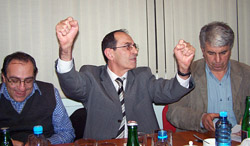 “The point of the inner PR of the authoritarian country is that it imitates democracy but it’s not democracy. Therefore, the whole state PR is directed to covering the authoritarian system. The democratic states don’t have such PR. Everything is done in a free and open way,” says the deputy.
“The point of the inner PR of the authoritarian country is that it imitates democracy but it’s not democracy. Therefore, the whole state PR is directed to covering the authoritarian system. The democratic states don’t have such PR. Everything is done in a free and open way,” says the deputy.
During the wrap-up part of his speech by saying that foreign PR can be conducted only by the country, which is in the third conditional level of inner PR. These are democratic countries. Kocharyan thinks that the foreign image of country a lot depends on its inner image.
 In the opinion of the director of the “Hayk” organization, Babken Vardanyan, PR is first of all contradicting our goal because it is characteristic for authoritarian countries. “PR means untruthfulness. Our task is to publicize what’s truthful for for inner and outer audiences. I think that Armenians are not quite aware of their situation. The awareness and self-determination level is not clear for Armenians. Regarding the foreign audience we very often wan to go talk to foreigners, tell them about our country. All that cannot be long-lasting and efficient. I think this is not a national state-level goal,” says Vardanyan. The information that is to be publicized is called a product, which must be produced and lots of efforts are needed for it. Thus, the raw material, preparation and packing must be done in a quality way. The market, where this “product” is to be sent, is competitive. That’s why the quality is important. “There are products that are made within the large countries, which don’t have too many difficulties to advertise those. For example, if Togo wants to go to France and tell others about himself, he needs to make a lot of efforts. Why would the French market buy the product of Togo. What’s its profit? Same about us. When we want others to accept and buy our product we need to work hard to prepare and pack it properly. Besides there are salesmen. That’s a specialty and everyone else cannot do it. We say our Diaspora, the church, etc. The Diaspora has its own business and time. Whenever we succeed in informing the Diaspora about the reality of ours we will be able to inform the foreigners as well,” said Vardanyan.
In the opinion of the director of the “Hayk” organization, Babken Vardanyan, PR is first of all contradicting our goal because it is characteristic for authoritarian countries. “PR means untruthfulness. Our task is to publicize what’s truthful for for inner and outer audiences. I think that Armenians are not quite aware of their situation. The awareness and self-determination level is not clear for Armenians. Regarding the foreign audience we very often wan to go talk to foreigners, tell them about our country. All that cannot be long-lasting and efficient. I think this is not a national state-level goal,” says Vardanyan. The information that is to be publicized is called a product, which must be produced and lots of efforts are needed for it. Thus, the raw material, preparation and packing must be done in a quality way. The market, where this “product” is to be sent, is competitive. That’s why the quality is important. “There are products that are made within the large countries, which don’t have too many difficulties to advertise those. For example, if Togo wants to go to France and tell others about himself, he needs to make a lot of efforts. Why would the French market buy the product of Togo. What’s its profit? Same about us. When we want others to accept and buy our product we need to work hard to prepare and pack it properly. Besides there are salesmen. That’s a specialty and everyone else cannot do it. We say our Diaspora, the church, etc. The Diaspora has its own business and time. Whenever we succeed in informing the Diaspora about the reality of ours we will be able to inform the foreigners as well,” said Vardanyan.
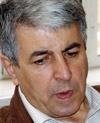 “The state as an institute doesn’t need any PR because I think everyone knows about that. Both the local media and the international one perfectly know what’s going on in the gven country. That’s why nothing can be solved through PR,” thinks the head of the Iranian Studies Faculty of YSU, Garnik Asatryan. In his words, the state has functions, which are very hard to cover or fake. “For example, if the elections are falsified everyone is going to know about that. In this regard PR cannot give much,” thinks Asatryan. He stresses the importance of the PR of the nation or people. What’s the image of our nation internationally? “During Soviet times Armenians were recognized in a few ways. First, as an educated nation because we overwhelmed in Universities and Academies. But at that time our stupid cinematography was presenting Armenians as barbecue makers. In fact we are academicians. Thus, there was contradiction between PR and reality. Now that we are independent the people are trying to present themselves. If you follow the notes of foreign travelers dating 17-19th centuries you will see that Armenians have always been presented as a complaining and depressed nation. And all those travelers speak with discontent about Armenians. They say the Turks and the Kurds are heroes, Georgians are noble. Now they are trying to recover the same image of Armenians connecting with the Genocide. The Genocide is the tragedy of Armenians, which we must also use as a political factor and as means to press on Turkey. It must be used in a very subtle way. But for example, the majority of Iranians know Armenia through the Genocide. I mean that today this image must not be cultivated in the international community. This is very dangerous and not appropriate for our nation. Believe me the Kurds have more sympathy in the international community than the Armenians with their complaints,” said Asatryan.
“The state as an institute doesn’t need any PR because I think everyone knows about that. Both the local media and the international one perfectly know what’s going on in the gven country. That’s why nothing can be solved through PR,” thinks the head of the Iranian Studies Faculty of YSU, Garnik Asatryan. In his words, the state has functions, which are very hard to cover or fake. “For example, if the elections are falsified everyone is going to know about that. In this regard PR cannot give much,” thinks Asatryan. He stresses the importance of the PR of the nation or people. What’s the image of our nation internationally? “During Soviet times Armenians were recognized in a few ways. First, as an educated nation because we overwhelmed in Universities and Academies. But at that time our stupid cinematography was presenting Armenians as barbecue makers. In fact we are academicians. Thus, there was contradiction between PR and reality. Now that we are independent the people are trying to present themselves. If you follow the notes of foreign travelers dating 17-19th centuries you will see that Armenians have always been presented as a complaining and depressed nation. And all those travelers speak with discontent about Armenians. They say the Turks and the Kurds are heroes, Georgians are noble. Now they are trying to recover the same image of Armenians connecting with the Genocide. The Genocide is the tragedy of Armenians, which we must also use as a political factor and as means to press on Turkey. It must be used in a very subtle way. But for example, the majority of Iranians know Armenia through the Genocide. I mean that today this image must not be cultivated in the international community. This is very dangerous and not appropriate for our nation. Believe me the Kurds have more sympathy in the international community than the Armenians with their complaints,” said Asatryan.
The next issue he proposed was anti-propaganda, which concerns Karabakh and other national issues. “Last year the Azeri president petitioned their historians to write fake history for money and prove that Armenians are a nomadic nation. This fact created a big confusion in Armenia, and even some scientists argued us to give them money too so that they can write such articles too. However, no one reads the articles that Armenian and Azeri people write. We should create a program for our national anti-propaganda. By the way, it is very easy to do. Evident propaganda is always failed in the West. We should create a very pragmatic system of accents and develop specific PR for our country. Furthermore, this should be done by others, thus we will have to spent huge money”, said G. Asatryan.
 The head of “Noravank” foundation, Gagik Harutyunyan reminded G. Asatryan about a film, which shows an image of an Armenian scientist. He agreed with the fact that the face of a barbeque-maker can’t be a good image for Armenians. “I think that our inner image should be very important for us and only after it is successful we will be able to “export” different products. We have some image problems with Russia, Europe and the Islamic world. It is a very serious factor and we should pay a due attention to it since it is directly connected with our national security” said G. Harutyunyan.
The head of “Noravank” foundation, Gagik Harutyunyan reminded G. Asatryan about a film, which shows an image of an Armenian scientist. He agreed with the fact that the face of a barbeque-maker can’t be a good image for Armenians. “I think that our inner image should be very important for us and only after it is successful we will be able to “export” different products. We have some image problems with Russia, Europe and the Islamic world. It is a very serious factor and we should pay a due attention to it since it is directly connected with our national security” said G. Harutyunyan.
Shavarsh Kocharyan thinks that the state should not discuss its problems only, but the general interests. “If you want to export means of solving your own problems from abroad, it will not work. For instance, let’s take the EU council. You can’t reach any results if you don’t ask questions to other countries and if you don’t speak about the problems that are interesting for everyone generally. Only after developing the issues in the mentioned manner you can advocate them. If we want to be isolated, we will not be success ever. Has anyone from our country reported about problems that are interesting for Europe generally? Is the EU only for criticizing Azerbaijan? If we stay being provincial, it will be nonsense to speak about foreign PR generally” said the deputy.
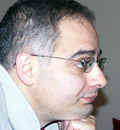 Politician Levon Zurabyan said that he didn’t like PR. T. Hakobyan noted that it was the reason why their government was failed and didn’t work well (For your information, L. Zurabyan used to be the press secretary of the first president of Armenia, Levon Ter-Petrosyan). “I think that it is better to understand that PR does not exist as a separate factor. PR is just a part of the policy that is being implemented in the given case. In other words, before making PR you should have a planned policy beforehand. I mean that firstly the government or people should decide what they want to do, and make the PR as a component of their policy. Even more, I don’t think there is a better PR policy than defining the goals and purposes in an optimal manner. Such policy is PR. For instance, concerning the war of Karabakh Armenia has always presented that war as a conflict for the purpose of protecting the right of the people of Karabakh for self-determination to live on their own land, but Azerbaijan has always presented the conflict as a war with Armenia, during which Armenia occupied its territories. Who did win this PR war? Before 1998 we targeted the principle of self-determination and it was reflected in all the documents, included in the document of the UN Security Council. Later, 1999 president Kocharyan tried to make the process easier for the international community and tried to involve also Karabakh in the process of negotiations, however, Karabakh was left out and the entire world accepted that fact as a war between Azerbaijan and Armenia. Here the Armenian and Azeri PR don’t matter at all. The only factor that placed a role was the changed policy” said L. Zurabyan. Concerning the issue of the Armenian Genocide the politician said that as a result of the fact that we don’t have a defined state policy for that issue, it has become a subject of PR, which has made the problem more complicated for us. “Now Turkey uses that fact that Armenia is participating in that PR campaigning for the purpose of attacking us. I think that the existing authorities are using the issue of the Genocide mostly not as a foreign PR component, but internal. Their goal is to make the society pay more attention to the Genocide issue but to corruption or other violations”, said L. Zurabyan and added that the former authorities had a reformation program; however, they didn’t have a campaigning policy. The politician thinks that now we don’t have a defined policy, but have strong PR, which purpose is to manipulate the public so that people don’t see the absence of such reformations.
Politician Levon Zurabyan said that he didn’t like PR. T. Hakobyan noted that it was the reason why their government was failed and didn’t work well (For your information, L. Zurabyan used to be the press secretary of the first president of Armenia, Levon Ter-Petrosyan). “I think that it is better to understand that PR does not exist as a separate factor. PR is just a part of the policy that is being implemented in the given case. In other words, before making PR you should have a planned policy beforehand. I mean that firstly the government or people should decide what they want to do, and make the PR as a component of their policy. Even more, I don’t think there is a better PR policy than defining the goals and purposes in an optimal manner. Such policy is PR. For instance, concerning the war of Karabakh Armenia has always presented that war as a conflict for the purpose of protecting the right of the people of Karabakh for self-determination to live on their own land, but Azerbaijan has always presented the conflict as a war with Armenia, during which Armenia occupied its territories. Who did win this PR war? Before 1998 we targeted the principle of self-determination and it was reflected in all the documents, included in the document of the UN Security Council. Later, 1999 president Kocharyan tried to make the process easier for the international community and tried to involve also Karabakh in the process of negotiations, however, Karabakh was left out and the entire world accepted that fact as a war between Azerbaijan and Armenia. Here the Armenian and Azeri PR don’t matter at all. The only factor that placed a role was the changed policy” said L. Zurabyan. Concerning the issue of the Armenian Genocide the politician said that as a result of the fact that we don’t have a defined state policy for that issue, it has become a subject of PR, which has made the problem more complicated for us. “Now Turkey uses that fact that Armenia is participating in that PR campaigning for the purpose of attacking us. I think that the existing authorities are using the issue of the Genocide mostly not as a foreign PR component, but internal. Their goal is to make the society pay more attention to the Genocide issue but to corruption or other violations”, said L. Zurabyan and added that the former authorities had a reformation program; however, they didn’t have a campaigning policy. The politician thinks that now we don’t have a defined policy, but have strong PR, which purpose is to manipulate the public so that people don’t see the absence of such reformations.
Concerning Shavarsh Kocharyan’s viewpoint Armen Ashotyan said that it is almost 3 years that Georgia is famous with its democratic image in the whole world, but it is not able to solve the problems of Abkhazia and Osia. Concerning G. Asatryan’s viewpoint that the “state PR” and “national PR” understandings should be separated Armen Ashotyan said, “It is very dangerous when state PR is compared to public PR. There is no public PR since the public have a state. The public wealth is the state”.
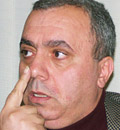 “I think that it is better to separate the formal side of PR from the real meaning. Then formal side may concern the government and civic institutions. As for the meaning, I think it concerns the mission of the given nation” said RA former prime minister Hrant Bagratyan. The latter says that first of all it is better to understand what T. Hakobyan means by saying “brand”. “Now it seems to me that the mentioned image brand is the Genocide. Now please imagine what our image brand could be. This conversation was done 15 years ago when Vazgen Manoukyan was elected in the prime-minister’s position. We became independent in 1990 and thus had a state. What could we do with it? The main priority goal of the state was creating values in the country. Please note that the values we have, i.e. Aznavour, William Saroyan, are not our own values. Now we have to create our own values and find out whether we can have such national values or not. That time Vazgen Manoukyan said a good thing, but no one paid attention to it. He suggested making Armenia “a crossroad”. The history says that Armenians are very clever and good nation, but they have a historical bad, which is the fact that their location is in crossroad. This is the reason why we have only 30.000 cm territory instead of 400.000. This is what Valeri Bryusov said about Armenians. I think it is the vice versa: Armenia started losing its territories from the moment when it stopped being a crossroad. Armenia will be very strong if it becomes a crossroad. One of our beneficial privileges is the fact that we are half-Asian and half-European. We shouldn’t say that we want to become a European nation. It is not logical. The Asian model lies in our genesis. In a word, our historical function could be serving as a crossroad between the Asian and European civilizations. Globalization is intensive exchange. No one likes nations that want to discuss their problems with them but get more benefits. It is becoming boring and this small ruse is becoming unbearable. No one likes a nation that can’t develop good relations with its neighbors, but wants to develop good relations with the neighbors of its neighbors. This means that we don’t have a geopolitical approach and will live well as far as they don’t try to drop something on our heads. I understand that we are in between two conflicting civilizations-Islam and Christianity. Our mission should be finding a convenient place in between those two civilizations. We could just tell the West that we could support them develop relations with the East, and say the same thing to the East as well. This should be our brand. In that period Vazgen Manoukyan said: “If we don’t want to be dependent from anyone, we should be dependent from everyone”. However, together with that mission we have a problem; I mean the conflict of Karabakh. We should protect our interests, thus a country that has such territorial problems can’t become an intermediate between civilizations. This is against our interests. Does this mean that we should reject the idea of becoming a crossroad? Furthermore, we have a strong Diaspora, which is ready to help us. Of course, they are more interested in the issue of the Genocide since there is a moral point that we should condemn the Turks for annihilating a whole nation. Anyway, this issue can’t be the most important one always. If the main goal is to become an intermediate, it is ten years that Turkey is trying to join the EU to develop faster. Today the EU needs in Turkey ten times more than in the Czech Republic or Ukraine. We suggested Europe our help to prevent the way of Turkey to the EU. Why? It is our neighbor and I think we should be interested in seeing Turkey in the EU. We could tell Turkey that we could support it connected with the mentioned issue, thus trying to make it relate differently to the issue of Karabakh. If our goal is becoming a crossroad for civilizations, why shouldn’t we make Armenia a big financial center? Our country adopted its banking law very fast, but the development scenario was not the one foreseen before that. I see a positive factor and I am happy for that. I think the vision to make Armenia an educational center in our region is coming true. The number of foreign students in our country is growing rapidly. I think that if we try to relate to this brand globally, we will be able to be represented in the world with another factor different than the Genocide issue too. The PR direction of our country is and should stay being an intermediate. We have good priorities in our region” said Hrant Bagratyan.
“I think that it is better to separate the formal side of PR from the real meaning. Then formal side may concern the government and civic institutions. As for the meaning, I think it concerns the mission of the given nation” said RA former prime minister Hrant Bagratyan. The latter says that first of all it is better to understand what T. Hakobyan means by saying “brand”. “Now it seems to me that the mentioned image brand is the Genocide. Now please imagine what our image brand could be. This conversation was done 15 years ago when Vazgen Manoukyan was elected in the prime-minister’s position. We became independent in 1990 and thus had a state. What could we do with it? The main priority goal of the state was creating values in the country. Please note that the values we have, i.e. Aznavour, William Saroyan, are not our own values. Now we have to create our own values and find out whether we can have such national values or not. That time Vazgen Manoukyan said a good thing, but no one paid attention to it. He suggested making Armenia “a crossroad”. The history says that Armenians are very clever and good nation, but they have a historical bad, which is the fact that their location is in crossroad. This is the reason why we have only 30.000 cm territory instead of 400.000. This is what Valeri Bryusov said about Armenians. I think it is the vice versa: Armenia started losing its territories from the moment when it stopped being a crossroad. Armenia will be very strong if it becomes a crossroad. One of our beneficial privileges is the fact that we are half-Asian and half-European. We shouldn’t say that we want to become a European nation. It is not logical. The Asian model lies in our genesis. In a word, our historical function could be serving as a crossroad between the Asian and European civilizations. Globalization is intensive exchange. No one likes nations that want to discuss their problems with them but get more benefits. It is becoming boring and this small ruse is becoming unbearable. No one likes a nation that can’t develop good relations with its neighbors, but wants to develop good relations with the neighbors of its neighbors. This means that we don’t have a geopolitical approach and will live well as far as they don’t try to drop something on our heads. I understand that we are in between two conflicting civilizations-Islam and Christianity. Our mission should be finding a convenient place in between those two civilizations. We could just tell the West that we could support them develop relations with the East, and say the same thing to the East as well. This should be our brand. In that period Vazgen Manoukyan said: “If we don’t want to be dependent from anyone, we should be dependent from everyone”. However, together with that mission we have a problem; I mean the conflict of Karabakh. We should protect our interests, thus a country that has such territorial problems can’t become an intermediate between civilizations. This is against our interests. Does this mean that we should reject the idea of becoming a crossroad? Furthermore, we have a strong Diaspora, which is ready to help us. Of course, they are more interested in the issue of the Genocide since there is a moral point that we should condemn the Turks for annihilating a whole nation. Anyway, this issue can’t be the most important one always. If the main goal is to become an intermediate, it is ten years that Turkey is trying to join the EU to develop faster. Today the EU needs in Turkey ten times more than in the Czech Republic or Ukraine. We suggested Europe our help to prevent the way of Turkey to the EU. Why? It is our neighbor and I think we should be interested in seeing Turkey in the EU. We could tell Turkey that we could support it connected with the mentioned issue, thus trying to make it relate differently to the issue of Karabakh. If our goal is becoming a crossroad for civilizations, why shouldn’t we make Armenia a big financial center? Our country adopted its banking law very fast, but the development scenario was not the one foreseen before that. I see a positive factor and I am happy for that. I think the vision to make Armenia an educational center in our region is coming true. The number of foreign students in our country is growing rapidly. I think that if we try to relate to this brand globally, we will be able to be represented in the world with another factor different than the Genocide issue too. The PR direction of our country is and should stay being an intermediate. We have good priorities in our region” said Hrant Bagratyan.
ARF member Gegham Manoukyan noted that for instance a black taxi driver in America does not know about Armenia since Armenia is not covered by the international Mass Media, notwithstanding the only way to that is the issue of the Armenian Genocide. However, T. Hakobyan said that even for covering the Genocide issue we should create an adequate image too, because now it inspires pity only. The latter thinks that we should look for alternatives for the mentioned brand. Concerning Ashotyan’s viewpoint that the internal and foreign PR should be separated Tigran Hakobyan said, “I don’t agree with that. If people are suspicious about legitimacy, their Ambassador cannot act in abroad and solve their problems there. All the components may be a tool for PR, included your people. They should be sure that they believe in their country and trust it so that they become a strong bearer of their positive image”.
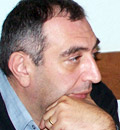 “PR is just a tool. When problems and issues are explained, PR shows the possible solutions. Foreign PR should be firstly coordinated by the state when the state wants to be represented in the world. We need a coordinated policy so that we can be represented in the world in the way we want and it should be done by specialists that we spoke about today. Otherwise people can do all what they think is good and thus influence differently. This is what the state should do, but not people”, said director of P-Art company, Karen Kocharyan. The latter thinks that the governmental PR is very important and notes that there are too many failures in that framework in Armenia. Karen Kocharyan brought only one example and said that when the music of Jivan Gasparyan was used in “The Gladiator” movie, we failed to make a good PR and be represented in the world in a duly manner. We were happy to see that and now the Armenian Duduk is used in many films in the world. The latter says that it is a very big failure for us that we don’t have a good Internet page to be represented in a duly manner. “When we are speaking about brands we should consider the facts that there are two possible scenarios; dialogue of civilizations and conflict of civilizations. Today we don’t tend to become a crossroad, but tend to go out of the blockade. Our way is closed because of our poor policy. However, our brand is very simple. For instance, the Iran-Armenia dialogue is a very good example. It should be our brand. The idea of a crossroad was failed due to a very simple factor; programs can’t be separated from the political system. Even the best programs may be failed if the political system is serving for the needs of people or a group of people. Firstly, Armenia should recover its image that it is the outpost of democracy in the region but not the outpost of Russia. Secondly, we can be a bridge between the East and West, the Muslim and Christian worlds”, said Shavarsh Kocharyan.
“PR is just a tool. When problems and issues are explained, PR shows the possible solutions. Foreign PR should be firstly coordinated by the state when the state wants to be represented in the world. We need a coordinated policy so that we can be represented in the world in the way we want and it should be done by specialists that we spoke about today. Otherwise people can do all what they think is good and thus influence differently. This is what the state should do, but not people”, said director of P-Art company, Karen Kocharyan. The latter thinks that the governmental PR is very important and notes that there are too many failures in that framework in Armenia. Karen Kocharyan brought only one example and said that when the music of Jivan Gasparyan was used in “The Gladiator” movie, we failed to make a good PR and be represented in the world in a duly manner. We were happy to see that and now the Armenian Duduk is used in many films in the world. The latter says that it is a very big failure for us that we don’t have a good Internet page to be represented in a duly manner. “When we are speaking about brands we should consider the facts that there are two possible scenarios; dialogue of civilizations and conflict of civilizations. Today we don’t tend to become a crossroad, but tend to go out of the blockade. Our way is closed because of our poor policy. However, our brand is very simple. For instance, the Iran-Armenia dialogue is a very good example. It should be our brand. The idea of a crossroad was failed due to a very simple factor; programs can’t be separated from the political system. Even the best programs may be failed if the political system is serving for the needs of people or a group of people. Firstly, Armenia should recover its image that it is the outpost of democracy in the region but not the outpost of Russia. Secondly, we can be a bridge between the East and West, the Muslim and Christian worlds”, said Shavarsh Kocharyan.
A. Ashotyan thinks that the fifth force is an obstacle for Armenia to have a good image and have good state values. “By saying the fifth force I mean a group of journalists, civilians, politicians that are spreading negative image. By the way, this is not common in Azerbaijan (several examples don’t play a key role)”, said the republican deputy.
“There is a model for that, according to which they can close all the oppositional papers, make a totalitarian system and not to allow any negative information go out” interrupted T. Hakobyan. A.Ashotyan replied, “If you are disputing the speech freedom with state treason, there is no need to explain anything”. Shavarsh Kocharyan interrupted and reminded Ashotyan that when he was returning from Europe, where he had made a speech about democracy, a group of people met him at the airport with posters written on them “Shavarsh betrayer”, and A. Ashotyan was one of them. “Being a member of the Armenian delegation I thought that we had general interests with them. I think that in that framework we supported the brand of Armenia, because when the Azeri oppositionists go there and “praise” their authorities, nothing may change. Accordingly, foreign political issues may not differ much from inner issues”, said the oppositionist. “Independent Mass Media is a key component to the state image, nevertheless, you mean the vice versa” said T. Hakobyan to A. Ashotyan. “There isn’t any country in the world that keeps from putting frames on independent Media. For instance, due to independence the Media discovered drug trafficking in Karabakh, however, it harmed the national and state interests much” said A. Ashotyan. The head of “Noravank” foundations thinks that Media role is very important too, however says that sometimes they should not use terms and cover information that may harm the national interests. T. Hakobyan thinks that there should be a center in Armenia, which would be in charge of developing strategic issues to Mass Media.
Concerning the image brand of Armenia Garnik Asatryan proposed several recommendations: “If we can make such films about the Genocide as the “Pianist”, we can make it our image brand. Nevertheless, we haven’t made such films so far, thus the brand of the Genocide is not so strong and we should leave it. The image of anti-Turkish nature is very dangerous and should be removed. There is a contradiction between that image and the nature of people. The idea of a crossroad spoke by Hrant Bagratyan is more prosperous. We should create that brand and it doesn’t matter it is adequate or not. That brand may be crated due to PR. There were Armenians living in Kazakhstan that wanted to return to their homeland. You can invite them here, give them a territory, build a Muslim temple there for them and send that information to Muslim countries. This point is very important for our national security.”
A. Ashotyan didn’t agree with the idea of a crossroad and says that it is utopia since Armenia is a center of geopolitical conflicts of civilizations. Concerning the idea of a crossroad for civilizations Shavarsh Kocharyan asked H. Bagratyan to tell them what the price of such a crossroad would be for Armenians, to which the former prime minister replied: “In order to become a crossroad you shouldn’t be the outpost of anyone. You should be a democratic state since the bearers of that ideology is the people. You shouldn’t try to integrate your neighbors with each other; you should integrate them with you. Historically those nations are strong that haven’t won their enemies, but have won themselves. The biggest problem that we have is to create a society that would be attractive for people and people would wish to live there. Otherwise they may leave for other countries; for instance Ukraine, where the GDP per capita is less than in Armenia. Our danger comes form inside, but not outside”.
 The RA prime minister listened to the viewpoints of the participants and after that expressed his own opinion. “The issue of the PR in Armenia is very important. We have problems in the government to define those issues and bring them up. The problem has always consisted in the tenure of the other prime ministers as well and the problem is that we are not able to create mechanisms that would solve those problems. We have thought about creating such mechanisms, however, it didn’t happen due to some reasons. This discussion contained many issues round the core issue. I think that it is important, but such issues should be discussed as well as with specialists and experts. There should be an institution that would compile all the ides spoken during this discussion and thus create an action plan on how to work those problems out. I think the foreign PR is more important than the inner PR. The inner PR has its image; the opposition is criticizing and the government is trying to explain everything in the best manner and in colors. Following that process the mentioned information is going out of the country, and people outside of the country are getting a bad image of our country. We have several professional institutions that are in charge of developing our PR outside of Armenia. There are also many Diaspora organizations that are trying to do that, but they don’t do that in an organized manner. This is not the problem of journalists and non-governmental organizations, but the problem of the government. If the government does not act in a duly manner, we will have losses, accordingly we should have our targets and programs how to reach the goals. Of course, people in Arabic countries, Europe and America are trying to solve other problems. If people use the same methods in all the countries, they will fail and lose. I am a successor of victims of the Armenian Genocide in Turkey, but have never thought that the Turks are my enemies. We shouldn’t break everything down and look for enemies; first of all we should find the reasons inside ourselves. We were not united and didn’t have a state. We should develop normal economic relations with Turkey. Why do you think we really depend from Russia much? We should explain all these issues in a duly manner. Why do they think that the foreign PR should be carried out by Armenians only? The other countries don’t think it is obligatory for them only; there are many foreign companies that can do that job very well. The state has the means, and the PR has the tools. We can do all we are able ourselves, and all what we can’t do, can be done with the help of others. We need to trust the government as our partner. We should try to found an institution in charge of governmental PR, which would be independent from the government so that it can continue its work in the tenure of the other governments as well”, said the prime minister.
The RA prime minister listened to the viewpoints of the participants and after that expressed his own opinion. “The issue of the PR in Armenia is very important. We have problems in the government to define those issues and bring them up. The problem has always consisted in the tenure of the other prime ministers as well and the problem is that we are not able to create mechanisms that would solve those problems. We have thought about creating such mechanisms, however, it didn’t happen due to some reasons. This discussion contained many issues round the core issue. I think that it is important, but such issues should be discussed as well as with specialists and experts. There should be an institution that would compile all the ides spoken during this discussion and thus create an action plan on how to work those problems out. I think the foreign PR is more important than the inner PR. The inner PR has its image; the opposition is criticizing and the government is trying to explain everything in the best manner and in colors. Following that process the mentioned information is going out of the country, and people outside of the country are getting a bad image of our country. We have several professional institutions that are in charge of developing our PR outside of Armenia. There are also many Diaspora organizations that are trying to do that, but they don’t do that in an organized manner. This is not the problem of journalists and non-governmental organizations, but the problem of the government. If the government does not act in a duly manner, we will have losses, accordingly we should have our targets and programs how to reach the goals. Of course, people in Arabic countries, Europe and America are trying to solve other problems. If people use the same methods in all the countries, they will fail and lose. I am a successor of victims of the Armenian Genocide in Turkey, but have never thought that the Turks are my enemies. We shouldn’t break everything down and look for enemies; first of all we should find the reasons inside ourselves. We were not united and didn’t have a state. We should develop normal economic relations with Turkey. Why do you think we really depend from Russia much? We should explain all these issues in a duly manner. Why do they think that the foreign PR should be carried out by Armenians only? The other countries don’t think it is obligatory for them only; there are many foreign companies that can do that job very well. The state has the means, and the PR has the tools. We can do all we are able ourselves, and all what we can’t do, can be done with the help of others. We need to trust the government as our partner. We should try to found an institution in charge of governmental PR, which would be independent from the government so that it can continue its work in the tenure of the other governments as well”, said the prime minister.
The head of the enterprise for information technologies union, Karen Vardanyan suggested a method for concluding the discussion. “Who owns Armenian PR and why? What is the goal of the PR and what is the collective image it has in its target? Is it an image of poor state, strong state or a crossroad? What is the main meaning of the PR actions? Is it reactive or active? What is the audience that the mentioned PR has in its target? Such problems are common in the U.S. and Italy too. When we speak about the fact that we are an old nation, some people think that we are alike and the others have other reaction. For instance, they may think we are alike with Iran. What are the substructures that would develop that PR? We have to analyze the institutions, Mass Media, governmental potential and other factors so that we can have enough information to work it out. What are the means? Do we have more financial or human resources? If the state is the main player, what is the part of the other ones in that process? Are we creating a vision for us or we are trying to make the others to take a mission to help us? What reaction are we expecting from the others? What is our goal? We are like a man that is speaking about his sicknesses everywhere and the other people don’t find anything interesting in him. That is the reason why we are keeping everyone far from us. I think that the goal of both the inner and outer PR should be one important thing for us; our country is a place, which survives and may develop with the help of its intellectual potential, makes its decision itself. If we develop this point, time will come when everyone will understand this”, said K. Vardanyan.
Now let’s discuss the issues proposed by Tigran Hakobyan that the Pressing discussed at the beginning. After the discussion the participants reached agreement upon some important issues. It is evident that the state needs to have a strong PR and create a good image abroad. The participants had different viewpoints concerning the image-brand of our country. Some of them agreed with the idea of creating a crossroad proposed by former Prime Minister Hrant Bagratyan, but the republican deputy didn’t agree with it and thought it was not real. As for the ARF, its representative assured that the best image brand was the Genocide issue. Nevertheless, there was a viewpoint that was agreed by everyone: Armenia does not have a concrete and targeted PR policy or strategy planning. The prime minister also agreed with that, even more, he said that it is the problem of the government and the state should solve that problem. The former prime minister said that they weren’t able to go along with the plan for becoming a crossroad before. Maybe the government does not know how to develop PR. As the main speaker of the discussion said, if the authorities realize that PR is important, they should develop it in the society through imperative actions (obligatory method).
The viewpoints of the participants and specialists may be very important to solve those problems. The “Pressing” club welcomes any ideas by our readers and the best ones will be discussed and published in “168 Hours”.
The “Pressing” club will organize had also scheduled another discussion on this topic with businessmen.
Photos by Serj Davidov

